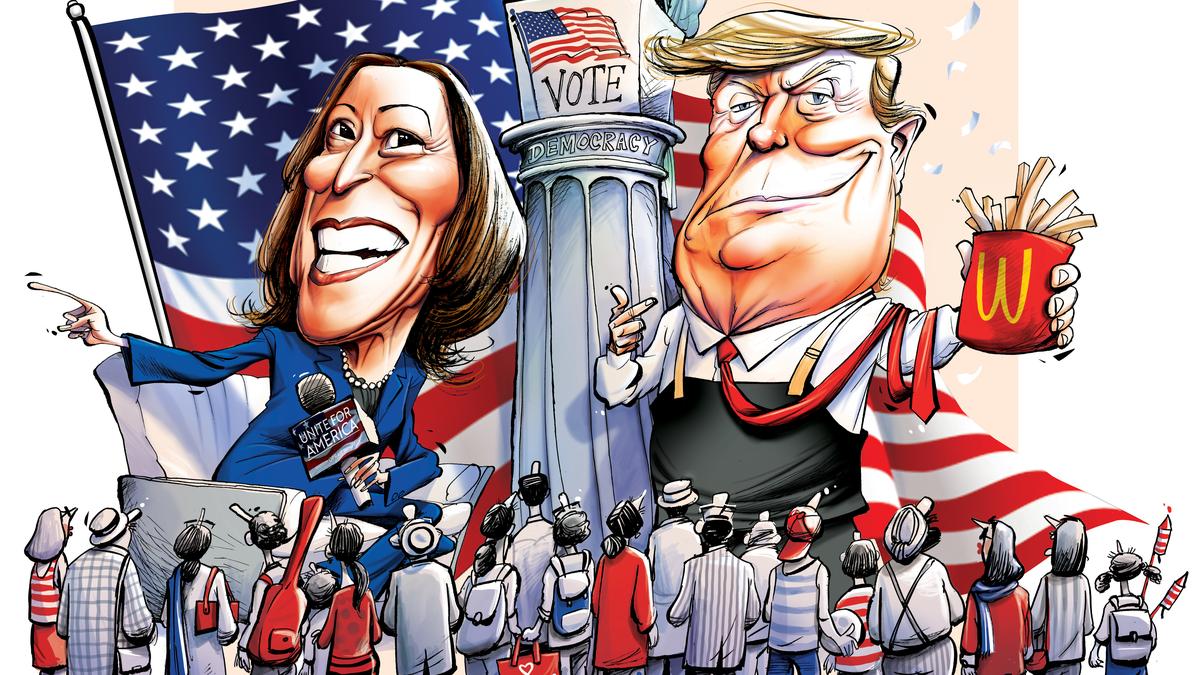
Hanging on to the American Dream Premium
The Hindu
Kamala Harris’ and Donald Trump’s connection with Indian Americans with the 2024 U.S. presidential campaign explored in depth.
On an unseasonably warm evening for the last week of October, Kamala Harris, along with former president Barack Obama and music legend Bruce Springsteen, rocked a stadium filled to capacity in an Atlanta suburb known as the most diverse square mile in America. The focus was on the majority population.
The Atlanta metro area is home to nearly 150,000 Indian Americans who have been rallying support for Harris. But if Indian Americans have been waiting for Kamala chitti, she has yet to make an appearance in the 2024 U.S. presidential campaign.
When Harris was running for vice president in 2020, her connection to the Indian American community was palpable. A video of her making dosas with actor-screenwriter Mindy Kaling went viral. Her sister and niece shared stories about her Chennai roots. Author and model Padma Lakshmi and YouTube star Lilly Singh endorsed her as one of their own, as the Indian heritage woman who had made it.
Once Harris emerged as the Democratic nominee earlier this year, they rallied, enthused by finding representation. The South Asian Women for Harris Zoom call, the first of her campaign, drew over 9,000 attendees — a turnout so vast that Zoom had to adjust its limits. Many of these women went on to host fundraisers, write postcards, change their social media profiles to ‘I support Kamala’, and share memes like, ‘In India, Kamala means lotus. In America, Kamala means POTUS’. Harris’ now-famous quip, “You think you just fell out of a coconut tree?” drew chuckles with the intimacy of an inside joke that wove a cultural bond.
But if the Indian American voters are looking for more, Harris is no longer wearing her heritage on her sleeve. She talked about her mother’s journey from Chennai to California at the Democratic National Convention, but has refused to be drawn into identity labels. A wise move for a candidate who vows to be a president for all Americans, but for many Indian Americans, it feels like she has drifted away from the representative figure they had embraced. As her engagement with the community has shifted, so has theirs with her. Many are now looking at her in the harsh light of real-life issues.
Meanwhile, Donald Trump’s engagement with Indian Americans has been a show of its own. In a recent viral video, he was seen handing fries to an Indian American couple at a McDonald’s drive-through. The man greeted him with a “namaste”, and the woman thanked him for “taking a bullet for them”. We now know that the scene was staged, but it managed to strike a chord. Trump has not shied away from playing up his ties with India. It also helps that Howdy Modi events are still fresh in the minds of those who see the Trump-Modi connection as a bridge to their own roots and religious identity. One of Trump’s moves was bringing the Indian-origin Usha Vance — wife of his running mate J.D. Vance — into the spotlight, even though there is no love lost between him and former presidential candidate Nikki Haley, also a daughter of Indian immigrants.
The tokenism, though, has not managed to sway many Indian Americans who question Trump’s ability to be a leader and a president for all Americans with his criminal convictions, sexual misconduct, and anti-immigrant rhetoric. In contrast, Harris has served as public prosecutor and California’s attorney general. At a recent rally, former first lady Michelle Obama questioned the expectation from Harris to be “flawless” while Trump gets away with being “lawless”.

Capt. Brijesh Chowta, Dakshina Kannada MP, on Saturday urged Union Finance Minister Nirmala Sitharaman to facilitate speeding up of ongoing critical infrastructure works in the region, including Mangaluru-Bengaluru NH 75 widening, establishment of Indian Coast Guard Academy, and merger of Konkan Railway Corporation with the Indian Railways.










